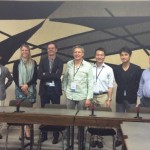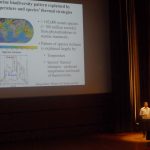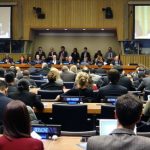Rapporteur de Paris
by Mathieu Colléter, Nereus Fellow
I had the great opportunity of spending the last three weeks in France to attend two conferences: the 12th French fisheries scientists’ symposium in Montpellier, and “Our Common Future under Climate Change” scientific conference in Paris (CFCC). This was an insightful experience, and since this is my debut performance in the universe of blogging, I would like to share this by highlighting some of the main aspects of the presentations delivered in the beautiful city of Paris. After all, “to blog”, hmmm, does it not sound vaguely Martian, as in “to grok“: a merging of bodies to achieve a collective understanding. But I digress!

Notre-Dame de Paris. Credit: Mathieu Colléter
During the CFCC conference at UNESCO in Paris, I was the rapporteur of a session entitled “Transformative pathways to sustain marine ecosystems and their services under climate change” as part of the Nereus research program. Climate change impacts on marine ecosystems were detailed by five speakers: Manuel Barange (Plymouth Marine Laboratory, UK), William Cheung (UBC, Canada), Shinichi Ito (University of Tokyo, Japan), Yoshitaka Ota (UBC, Canada), and Patrick Lehodey (CLS, France; see detailed program here). These five presentations and associated discussions taught three key lessons from my researcher perspective.
First, uncertainty in climate change modelling doesn’t put the brakes on communicating scientific results. In fact, there are robust evidences of climate change impacts on marine ecosystems (e.g., distribution changes and ocean acidification); and key parameters to consider when modelling these impacts have been identified. It is now important to focus research on detailing general trends (e.g., the heterogeneity of distribution changes), and on processes that remain poorly understood as the changes in the zooplankton compartment or the evolution of the sea ice cover. Thus, we, as fisheries scientists, need to systematically quantify the full range of uncertainties, including the potential interactions between fishing and climate change on marine ecosystems and fisheries. But we also need to do a better job at communicating this to all stakeholders, with, for example, the use of risk assessments.
In this sense, recent research has shown that fisheries rebuilding can compensate for most climate change impacts predicted at temperate and high latitudes. The situation in the tropics is much more uncertain, and necessitates immediate actions to improve ecosystem health and fish stocks status. This conclusion is of particular interest, since it emphasizes the need to continue to improve fisheries management and sustainability through an Ecosystem Approach to Fisheries. The situation in the tropics is worrying, since this area encompasses developing countries that can heavily rely on marine species for protein supply. Thus, it is an urgent need to account for climate change in fisheries management worldwide.
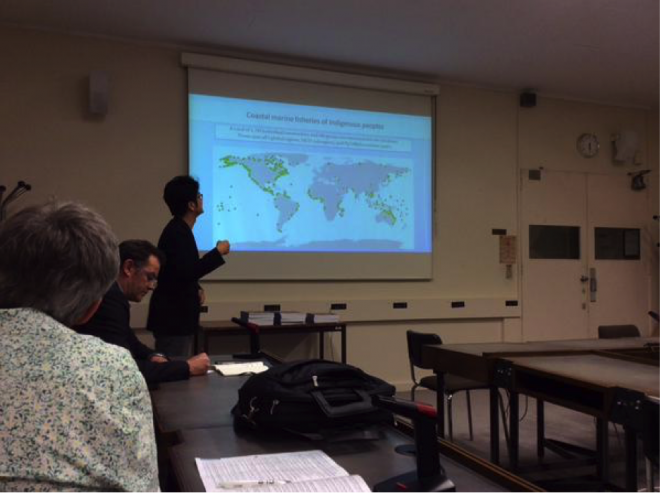
Yoshitaka Ota presenting on the impacts of climate change on indigenous people. Credit: Johanna Lee Sadik (@johannaleesadik).
Finally, and following previous conclusions, it appears important to consider climate change impacts on human security. Presentations have shown that climate change will have social and political consequences, e.g., cultural impacts on indigenous people or political consequences through potential changes in fisheries management and economics. In fact, there is a need to adapt the Law of the Sea and managing authorities that do not account for climate change impacts. Hence, it appears important for us as scientists to communicate climate change impact predictions (and the associated uncertainty), since climate change impacts cascade through society and that can have a feedback effect, that’s to say you as a political entity and a consumer. It was therefore great to be covered on Twitter by Johanna Lee Sadik (@johannaleesadik), a social media team member for the conference.
So this first post is my “2 cents’ worth” towards that effort! I hope it will raise discussions, and will enable you to think about actions and reactions in your own field of expertise. Personally, I found this session very inspiring, and it bolstered my desire to work towards a better understanding between science and policy-making, or, failing that, between science and cheese-making.
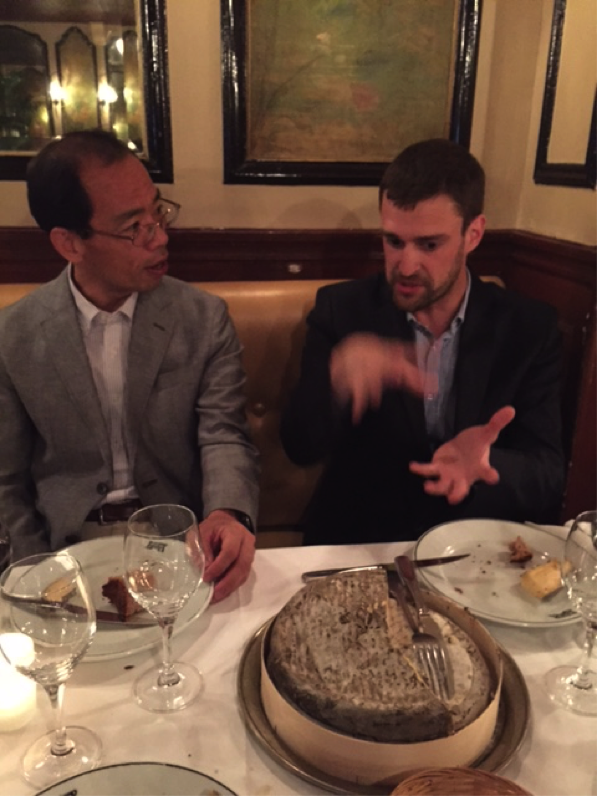
Cultural lecture on cheese to Professor Ito. Credit: Yoshitaka Ota.

MATHIEU COLLÉTER, PHD, ZOOLOGY, UBC
Mathieu Colléter is a fisheries scientist whose research focuses on ecosystem modelling and trophic networks. He is currently working on the production of biomass estimates for the 180,000 ½ degree Sea Around Us cells covering all oceans, from 1950 to 2010, using ecosystem modelling (EcoTroph) and the Sea Around Us’ new spatialized catches. This will be used to model future changes in global biomass and fisheries catch under climate change scenarios.


